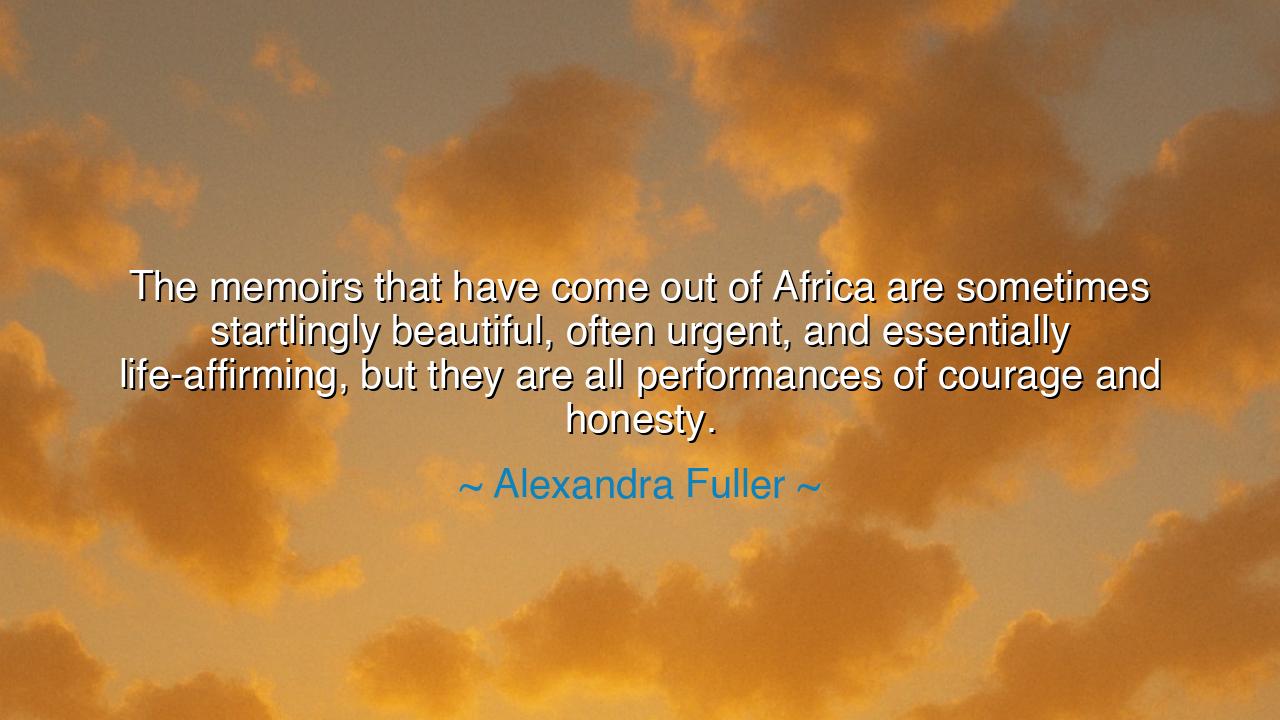
The memoirs that have come out of Africa are sometimes
The memoirs that have come out of Africa are sometimes startlingly beautiful, often urgent, and essentially life-affirming, but they are all performances of courage and honesty.






“The memoirs that have come out of Africa are sometimes startlingly beautiful, often urgent, and essentially life-affirming, but they are all performances of courage and honesty.” Thus spoke Alexandra Fuller, the writer whose words are steeped in the red earth and fierce heart of the African continent. In this reflection, she pays homage to those who have dared to tell their truths — the writers, survivors, and witnesses of a land both magnificent and merciless. For Africa, she suggests, is not merely a place; it is a crucible where the soul is tested by beauty and by pain, where the act of remembering becomes an act of courage, and the act of telling becomes an offering of honesty.
To write of Africa — truly write of it — demands more than skill; it demands truthfulness of spirit. The memoirs born from its soil are not crafted in comfort but carved from the bone of experience. They speak of the savannas that blaze under unrelenting suns, of the sudden violence that can descend like a storm, of the quiet resilience of people who endure both oppression and exile, and yet find ways to sing, to love, to hope. Each memoir, Fuller tells us, is a kind of sacred performance — a test of integrity. For in a land where life can change in a moment, to tell one’s story with honesty is to face one’s own heart without disguise.
The origin of Fuller’s understanding lies in her own life. Born in Rhodesia (now Zimbabwe), she grew up amid the turbulence of war and the shifting sands of colonial collapse. Her own memoir, Don’t Let’s Go to the Dogs Tonight, bears witness to this world — a world of contradictions, where laughter mingles with loss, where beauty and brutality walk hand in hand. In writing her story, Fuller herself joined the lineage of African memoirists whose work stands as both remembrance and revelation. She knew that the truth of Africa cannot be told without exposing one’s deepest fears and most fragile hopes. In that exposure lies courage, and in courage lies freedom.
The beauty of these memoirs, as Fuller describes, is not the polished kind found in perfection, but the raw, untamed beauty of survival. They are startlingly beautiful because they dare to hold joy and suffering in the same breath. In them, the reader feels the pulse of humanity — the shared heartbeat of those who have endured hunger, war, displacement, and love. Consider Nelson Mandela’s Long Walk to Freedom. It is not merely a political history; it is a memoir of courage and honesty, where a man strips himself of bitterness and chooses forgiveness. Through that act of truth-telling, Mandela transformed his personal pain into a beacon for the world. His words, like Fuller’s, remind us that every honest story becomes a light against darkness.
Yet Fuller also calls these memoirs urgent — for they are born from necessity. When the world turns its eyes away, the writer must speak. When memory itself begins to fade, the writer must record. In Africa, where history is often written by the powerful, the memoirist becomes the voice of the overlooked — the villager, the exile, the child of conflict. Their stories reclaim humanity from silence. This urgency is not only political but spiritual: to tell one’s truth before it disappears is to affirm that life, no matter how brief or brutal, has meaning. In that affirmation lies what Fuller calls life-affirming power — the ability to stand before the chaos of existence and declare, I was here. I mattered.
To write with honesty is an act of rebellion, and to write with courage is an act of grace. The memoirs Fuller honors are not self-indulgent tales; they are acts of witness. They carry the weight of memory so that others may understand what it means to live, to lose, and to begin again. These writers do not seek pity; they seek connection. And in their openness, they invite the reader into the universal struggle of the human condition — the search for dignity amidst suffering, for peace amidst turmoil, for meaning amidst chaos.
Let this, then, be the lesson: in every age and every land, the truest stories are born from courage and honesty. Whether you are a writer or not, you too are the author of your own life. Do not fear to remember; do not fear to tell. When you speak truth — even if your voice trembles — you affirm the beauty of being alive. When you act with courage — even when the world seems unkind — you join the great lineage of those who have turned pain into wisdom.
Thus, the words of Alexandra Fuller stand as both tribute and commandment: that every story worth telling must be a performance of the soul — an offering of truth before the altar of time. For in the end, it is not the grandeur of our achievements that will endure, but the honesty with which we have lived, and the courage with which we have spoken our truth. In this, as in the greatest African memoirs, lies the eternal dance of humanity — wounded, radiant, and forever striving toward the light.






AAdministratorAdministrator
Welcome, honored guests. Please leave a comment, we will respond soon